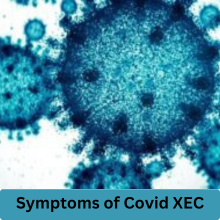
As we continue to navigate the ever-evolving landscape of Covid-19, a new strain named Covid XEC has emerged, raising questions and concerns. The UK Health Security Agency (UKHSA) has reported a notable increase in cases, making it crucial for everyone to understand the symptoms associated with this variant. Knowing what to look for can help you act quickly and protect yourself and others. So, let’s break down what Covid XEC is all about, the symptoms it presents, and how you can safeguard your health.
What is Covid XEC?
Background of the Virus
Covid XEC is the latest strain to join the long list of variants that have emerged since the pandemic began. First identified in the UK, this strain has been observed to spread rapidly, which is a common trait among its predecessors. With its roots in the Omicron family, it’s essential to keep an eye on how it behaves and evolves.
Variants Combined
What sets XEC apart is that it’s a recombinant variant, formed by the merging of two other strains: KS.1.1 and KP.3.3. Think of it like a genetic cocktail, where traits from both variants mix to create a new strain. This blending of characteristics can lead to changes in transmissibility and symptoms, making it imperative for health officials to monitor its impact closely.
Symptoms of Covid XEC
Common Symptoms
Covid XEC shares a similar symptom profile with other Covid variants, which is both a relief and a concern. Recognizing these symptoms early can help in taking appropriate action. The common symptoms associated with XEC include:
- High temperature: A noticeable rise in body temperature.
- Aches: General body aches, similar to flu symptoms.
- Tiredness: A feeling of exhaustion that doesn’t seem to fade.
- Cough or sore throat: Persistent cough or irritation in the throat.
You may also experience:
- Loss or change in smell or taste: Though not as prominent, some patients report changes in their sensory perceptions.
- Shortness of breath: Difficulty breathing or a feeling of tightness in the chest.
Distinguishing Features
While the symptoms are not entirely unique to XEC, the rapid spread and slight variations in severity are worth noting. Health organizations have yet to confirm any specific symptoms that are exclusive to XEC. Therefore, staying aware of any symptoms, even mild ones, is crucial.
Also read: CVS Shocker: Karen Lynch Out, David Joyner Steps In!
The Current Situation in the UK
Rising Cases and Hospitalizations
As of early October 2024, the UKHSA reported an increase in hospital admissions related to Covid, with a rate climbing to 4.5 per 100,000 people. This uptick follows a previous rate of 3.7, indicating that the XEC strain is gaining traction. While this rise might be alarming, it’s part of a larger trend often seen as we transition into winter, a season notorious for respiratory illnesses.
Public Health Recommendations
Despite the absence of legal requirements for self-isolation, the NHS strongly recommends that anyone testing positive for Covid avoid contact with others for at least five days. This precaution is especially important for those who may be vulnerable or at higher risk of severe illness. In fact, the NHS advises limiting interaction with vulnerable individuals for a full 10 days after testing positive.
How to Protect Yourself
Vaccination Guidelines
One of the most effective ways to shield yourself from Covid XEC and other variants is through vaccination. The NHS has rolled out autumn Covid boosters for high-risk groups, including:
- Individuals aged 65 and over
- Those aged six months to 64 with underlying health conditions
- Residents in older adult care homes
- Frontline NHS and social care workers
Eligible individuals can book their booster appointments via the NHS App, GP offices, or local pharmacies. Staying up-to-date with vaccinations is key to maintaining a robust defense against Covid.
General Preventive Measures
In addition to getting vaccinated, adhering to general preventive measures can significantly reduce your risk of contracting or spreading the virus. Here are a few straightforward tips:
- Wear a mask in crowded or indoor settings.
- Practice good hand hygiene: Wash your hands frequently with soap and water, or use hand sanitizer.
- Maintain physical distance from those who may be symptomatic.
- Stay home if you’re feeling unwell: It’s better to err on the side of caution.
The Future of Covid XEC
Potential for Dominance
With analysts predicting that XEC may become the dominant strain as we head into winter, it’s vital to remain vigilant. Covid strains often exhibit seasonal patterns, and the combination of XEC’s transmissibility and the onset of colder weather could lead to an increase in cases.
Monitoring and Research
Health organizations are actively monitoring the XEC strain and conducting research to understand its impact better. Dr. Jamie Lopez Bernal from the UKHSA mentioned, “Current information doesn’t suggest we should be more concerned about this variant, but we are monitoring this closely.” This careful approach underscores the importance of staying informed and adaptable as new data emerges.
Alson read: Dallas Wings Fire Coach Latricia Trammell: Shocking Move!
Conclusion
As the Covid landscape continues to shift with the emergence of new variants like XEC, staying informed is more crucial than ever. Understanding the symptoms, getting vaccinated, and following public health guidelines can help you navigate this ongoing challenge. While the presence of XEC may raise eyebrows, taking proactive steps ensures that you and your loved ones stay safe and healthy.
FAQs
What are the symptoms of the XEC variant?
The symptoms include high temperature, aches, tiredness, cough, sore throat, and in some cases, loss of smell or taste.
How does XEC compare to previous variants?
XEC has similar symptoms to other Covid variants but is noted for its potential increased transmissibility.
When should I get vaccinated?
If you are eligible, it’s advisable to get your booster vaccination as soon as possible to enhance your protection against Covid.
What should I do if I test positive for Covid?
You should self-isolate for at least five days and avoid contact with vulnerable individuals for ten days.
Is there any specific treatment for Covid XEC?
Currently, there are no specific treatments for XEC, and management focuses on symptomatic care and supportive measures.

